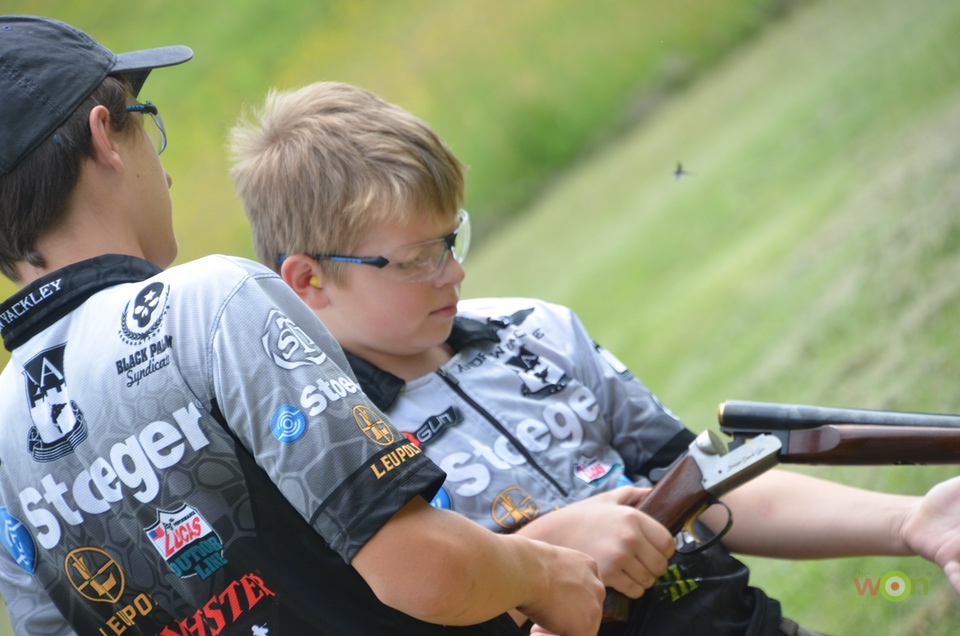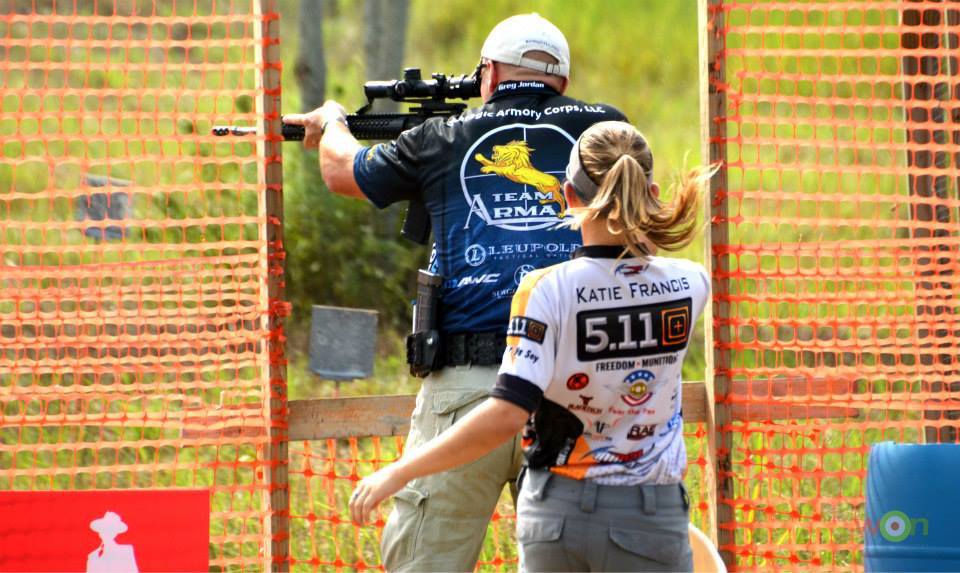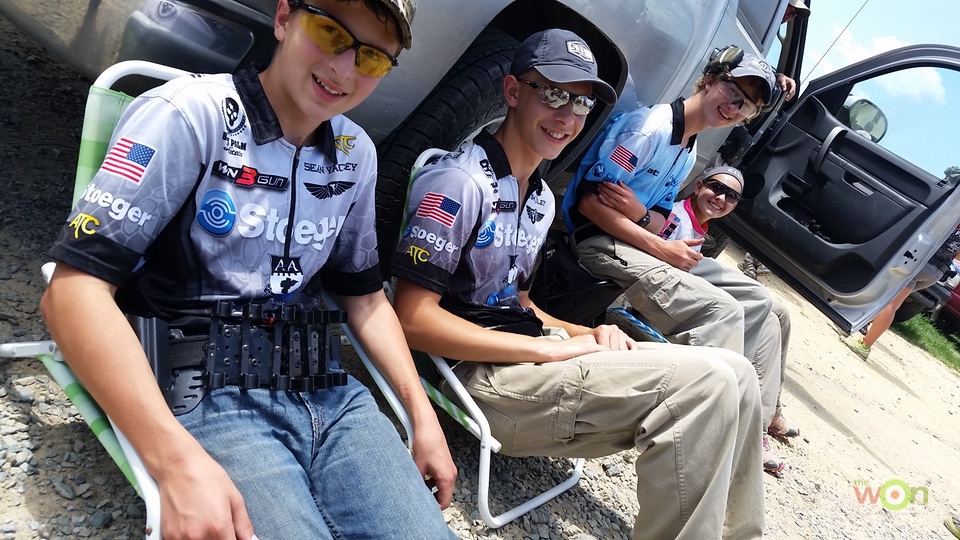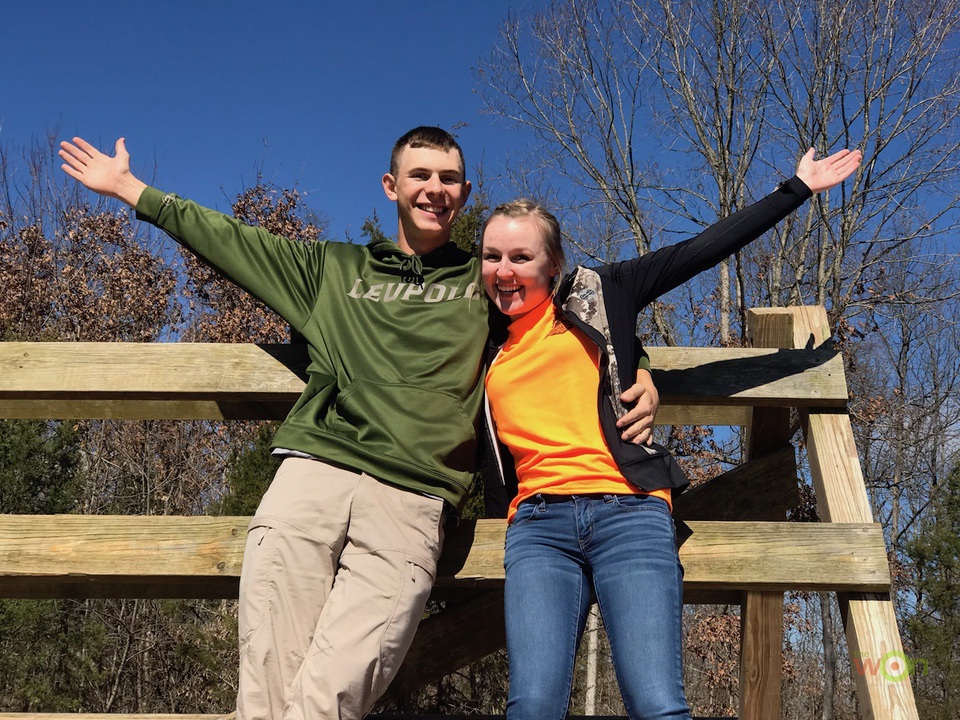When you were a kid, you probably heard your mom say, “Don’t swim after eating!” When you took hunter safety, you learned about hunting with a partner, or if you were lucky enough to live in a state with mentored hunts, you probably spent a lot of time in the woods with a parent, grandparent, aunt, friend, etc. Most of firearms ownership is shared by partnering with someone. And just like a day at the beach isn’t something most people do alone, a day hunting or shooting is usually shared with friends and family. But when is it OK to let your child spend time with firearms alone to shoot solo? When can you trust your kid? I’m going to share some examples of things my family has done to establish safe habits and build strong bonds to the thing we love.
Not a Soccer Mom is sponsored by Jagemann Sporting Group
First, I like the comparison to a day at the beach, because while a beach is beautiful and relaxing, there can be dangers. You wouldn’t swim unsupervised, but you sure could sunbathe and walk in the surf alone. Shooting can be looked at much like a day at the beach: beautiful, but potentially dangerous, if you don’t follow the rules of safety.
What are the rules that govern using guns alone? Well, for hunting, we have age limits. In many states, once you have taken an approved Hunter Education course, you are not immediately allowed to hunt by yourself. There are rules that require a hunter to be over a certain number of years to hunt without an accompanying adult. If you are under the specified years, you often have to be with an adult, or within so many yards of an adult and within sight. Then, things change as your youth turns into an adult; for example, when a hunter turns 18, that young person may be able to hunt solo. But, that should still depend on individual plans for the day, skills, and what the family’s expectations are … just like the beach! We wouldn’t tell 11-year-old Suzy to go swim alone in the surf, and even at 16, Suzy might need someone she can wave to that reminds her the tide is coming in. But 18-year-old Suzy … she might be fine surfing with friends and rolling in to rest at lunch and text her mom that she’s done at the beach. Change the element of danger from riptides and water to firearms; it’s very similar. It’s a progression based on experience, personality, the task at hand, and a lot of variables that require parents to do the whole “parenting” thing. You need to be active in your child’s life to get to this point.

Boys working together) Brothers Sean and Andrew Yackley working together on shotgun skills. Everyone is a Range Officer when it comes to safety, no matter how old or how experienced! And if you see something, speak up, and listen to others, because it might be important.
The 1 item that I think hunting regulations take into account without labelling it as such, and parents see this when they decide if their kids should hunt or even plink in the back field alone, is a child’s personality. As a parent of young shooters and hunters, I’ve experienced this process firsthand. What I could allow one of my sons to do at 14, another might not have been ready for, because they don’t think the same way. And a good rule of thumb for anyone considering when a child is responsible enough is to look at the hunting regulations: 12 and under, usually have to physically be with you, whereas between the ages of 12 and 16, they need to be nearby, and you should be able to see the young hunter. At ages 16 to 18, maybe close enough to get away with a shout might be the agreed upon practice. From 18 to 80, you still want to have contact, at least once a day … who knows if Grandpa has returned from the woods? Best to check. But this is very similar to a day at the beach. There isn’t carte blanche to dive into the water without looking around first.
Some of the rules I’ve given my boys when shooting without myself or my husband present:
Everyone is a range safety officer, aka RO. I don’t care if you’re a 5-year old or 50-year old, if you think something is unsafe, or even could become unsafe, STOP, and stop everyone there till it’s fixed and made safe. I always add that if they think I might yell, “Why would you do that!?” they’ve already probably gone too far. This is my rule about life; if you have to ask if it was a good idea, it’s probably not. But something unsafe can be as simple as someone’s eye pro fell off, a target is sending back bits of jacket because it’s damaged, or you’re not sure if your brother unloaded his gun and showed clear before you decide to walk downrange … just stop. Be the range officer and keep everyone on track. This is how growing up with firearms teaches maturity and responsibility – by setting expectations and holding yourself and others to them, even when Mom isn’t watching. Being comfortable around guns, comfortable to the point where you let your guard down, is where most of the experienced firearms owners say trouble comes in. Gunsmiths will tell you amazing stories of their pal so-and-so who had a bullet hole in his ceiling or floor because he got too comfortable and didn’t obey the 4 major rules of gun safety.
Don’t push yourself or your limits. Just like you wouldn’t let a 10-year old try to swim out past the current to surf in on a big wave alone, don’t let your youngster try to go to the range alone to learn new skills, or push speed. Speed drills and serious training should always be done with a partner, both to keep you safe, and to be that extra set of eyes. If you don’t have a swimming buddy, you might not notice the tide coming in, and without a shooting partner, you can develop bad habits or fail to see the obvious. Just like eye and ear protection – it’s easy to forget to put it back on, and while it probably won’t kill you to fire one round, it could be devastating to your sight or hearing. My boys at 19 and 18 or 15 and 16 would practice together often.

Young people often make incredible Range Officers because they can follow directions and lack the ego that can sometimes keep an adult from speaking up … they don’t hesitate to tell you when you are wrong. Raising kids to follow the rules of firearms safety is important, as it teaches kids about rules in the broader sense and how everyone being personally responsible makes life better for those around us
Wrap up before you are tired. Again, just like swimming, don’t put yourself into a situation where you are losing mental clarity because you’ve worn yourself out. Parents do a lot more monitoring than they think they do … call it thin-slicing, call it taking in all the unmeasurable things that tell you a child is tired or wearing out – you know, the sounds, looks, way they carry themselves. Whatever it is, we see it. Kids are not as good at seeing when enough is enough. It’s why parenting is a difficult job. You’re responsible for someone’s life! So don’t put that on a kid. Set limits so they can’t get too tired. Set limits for others around them, too. People without kids often do not have a sense of what is or isn’t too much, and teach your child to know when they can even tell adults “No.”
Be an engaged parent. Let me be very clear in saying that when I let my boys “shoot alone,” they are no farther than outside my house. Within shouting distance, usually visual distance, and I peek out at them. I’m monitoring what’s going on, even with our 19-year old. Why? Not that I don’t trust him, but I care about being involved in my boys’ lives. I’m not an onlooker; I have decades invested in them, and they’re mine, whether they like it or not! There’s no do-overs one mistakes with tools – guns, power tools, cars – they all have power and need respect.
Range time without the family. When do you know it’s OK to allow your kids to travel to the range without you? Maybe that’s to shoot a match, attend a camp, or a clinic. Whatever it is, you should consider a few things. I look at my child, would I let them shoot that event alone? Would I want to shoot it alone? Who will they travel with? Squad or pair up with? Who else will be at the event that I trust, were my child to need help with a malfunction or a ride, or maybe they were just tired? All those things come into play. The biggest consideration I have comes from knowing my own child. I think that’s what a lot of parenting comes down to – how well you know your own child. Will my child be the kid at the match that people look at and think, “Hmmm, that was not a good plan,” or will my 15-year old be someone who can offer others advice and chat with them like any adult? If it’s the latter, I know they’re OK going without me.

Staying safe at any sporting event is your responsibility, but friends that are there to remind you to put your glasses back on, stay out of the sun, and make sure you have hearing protection are just as useful as friends you take to the beach or out fishing on a boat. They’re your backup, your extra set of eyes … and teaching your own children to think about others is helping train them into responsible adults.
Shooting and hunting are like any sport. They are usually more fun with friends along. While the shooting sports can be dangerous if safety isn’t practice, they statistically hold fewer dangers to the bodies of young people than high-impact or contact sports such as wrestling, football and soccer. While you can train with teammates and learn from your peers in shooting and hunting, you also have a real sense of individual accomplishment, and that’s a commodity many young people can grow from, especially in their teenage years when facing challenges leading into adulthood. Problem-solving on their own, understanding and forming their own plans, and taking responsibility for their own safety are tools gained through many sports, but especially through shooting sports. So encourage your kids like you would in any part of life, from an age-appropriate distance, with an understanding of the person they are and the goal of helping them grow to be the person you know they can be.

Kids turn into adults before we know it. Giving them supervised time to develop leadership skills and challenge themselves is easily accomplished on the range, and they’ll make good friends along the way.
Becky Yackley primarily competes in 3 Gun, USPSA, Bianchi pistol, but has competed in shooting since 1989 in disciplines from service-rifle, to NCAA Air Rifle and Smallbore, air pistol and a little bit of long range rifle. She shoots guns and cameras at competitions around the country, and writes in her fictional spare time. View all posts by Becky Yackley